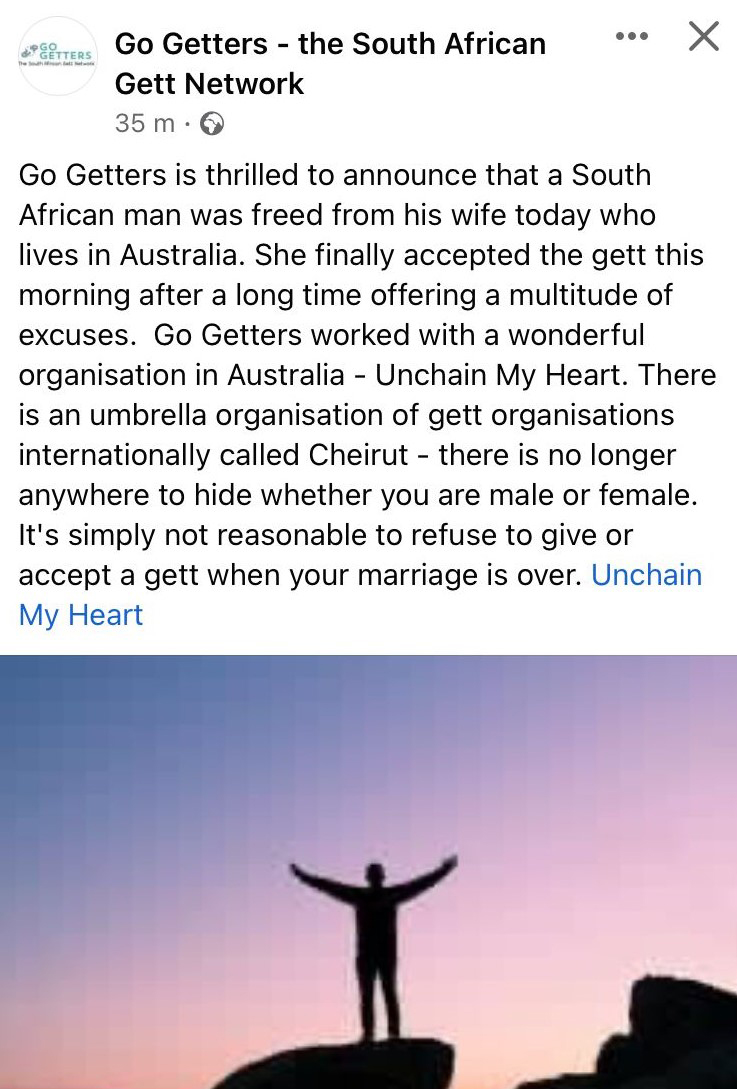
Banner

Till a gett us do part: man freed as wife accepts divorce
People often see difficulties in getting a gett (a Jewish divorce) as a purely male issue. A man may refuse to give it, and will therefore make the woman an agunah (chained woman). But what if it’s the other way around – a wife refusing to accept a gett that her husband wants to give?
This was the case recently when a South Africa couple had a civil divorce, lived in different countries, and had moved onto new relationships. Yet the woman refused to accept the gett, meaning that the pair was still married according to Jewish law.
“I felt angry, like she had a hold on me and my life was in limbo,” says the man, speaking to the SA Jewish Report on condition of anonymity. “My advice to anyone in a similar situation is to get as much help as you can. This isn’t just for women. It’s about a power struggle. Men are suffering too, and there’s help out there. I finally feel like a free man.”
Meanwhile, Go Getters – the South African Gett Network, wrote on Facebook on 10 August that it was “thrilled to announce that a South African man was freed from his now ex-wife today who lives in Australia. She finally accepted the gett this morning after a long time offering a multitude of excuses.
“Go Getters worked with a wonderful organisation in Australia called Unchain My Heart,” it said. “There’s now an umbrella group of gett organisations internationally called Cheirut. There’s no longer anywhere to hide whether you’re male or female. It’s simply not reasonable to refuse to give or accept a gett when your marriage is over. In this case, Go Getters liaised primarily with the Johannesburg Beth Din and the husband who is based here, and Unchain My Heart liaised with the wife in Australia and the Melbourne Beth Din.”
“These kinds of cases aren’t so rare,” says Go Getters founder Michelle Blumenau. “We have had a few of them. The gett process requires two willing parties who are willing to give or accept it. If either is unwilling, it can’t proceed.
“All cases (where one party is unwilling) are essentially the same,” she says. “They are about abuse, and exerting power.” She says often a party will refuse to accept or give a gett because they are vindictive or spiteful. In most cases, the “marriage has been dead a long time”.
“I had one case where a woman said, ‘I hate him, he’ll never be free!’ So, rarely is it a case of one party genuinely wanting to hold onto the marriage.”
Yet, a woman refusing a gett doesn’t happen every day. Even the mandate of Go Getters is directed mainly at women. “Go Getters aims to support Jewish women in various ways,” says the organisation’s Facebook page.
“We want to support agunot with recalcitrant husbands actively in ways that they would find useful. We stand for liberation and social justice for women and their families. There are men whose wives are refusing to accept the gett. We are open to working on these cases too! We don’t advocate physical violence against gett refusers. This is illegal in South Africa.”
Blumenau says there’s a Jewish law that can help free a man whose wife refuses the gett if every other avenue has been tried. Heter meah rabbonim (permission by 100 rabbis) can be applied to certain extreme cases, such as a man whose wife is missing or refuses to accept a gett for an extended period, or when the wife is mentally unable to give consent to receiving a gett.
To get a heter meah rabbonim, a man would previously have to wander from town to town and one country to another with a letter from the Beth Din and would have to plead his case with every town rabbi to get their approval. Later on, written permission by mail was accepted, and sometimes an intermediary was used to plead the case. In the past century, with the ease of communication, the process has become more formal and the Beth Din takes the lead and secures the 100 signatures required.
Blumenau recalls at least two cases where this has happened in South Africa. Thankfully, this most recent case didn’t require it. However, both Go Getters and the Beth Din had to deal with a litany of excuses and refusals, such as blaming lockdown and social distancing. At one point, the woman said the gett was “in no way to my advantage as I don’t intend to remarry”.
Go Getters co-founder Balu Nivison works with Blumenau from Cape Town. Both are passionate about their cause. They also have a strong informal network which supports them, from social services to lawyers.
Blumenau says working with gett-advocate organisations internationally has helped resolve cases like these. International gett organisations also work closely on cases like that of infamous gett refuser Hershy (Hermann) Fried.
Fried’s divorce in Israel was never finalised as he escaped the country in spite of a court order that prohibited him from leaving. Since then, he has run from country to country (including South Africa) as a fugitive, keeping his wife, Susie, tied to their non-existent marriage. He has been in cherem (excommunicated) for at least half a decade already. He continues to ignore all court orders and decisions imposed on him by rabbinical courts as well as the family court. There is a warrant for his arrest in Israel.
Blumenau suggests that ideally, Jewish couples getting divorced should secure their gett prior to their civil divorce. “If you don’t, you must highlight this for the judge and insist that there’s a clause that mentions the gett in your divorce agreement,” she says.










